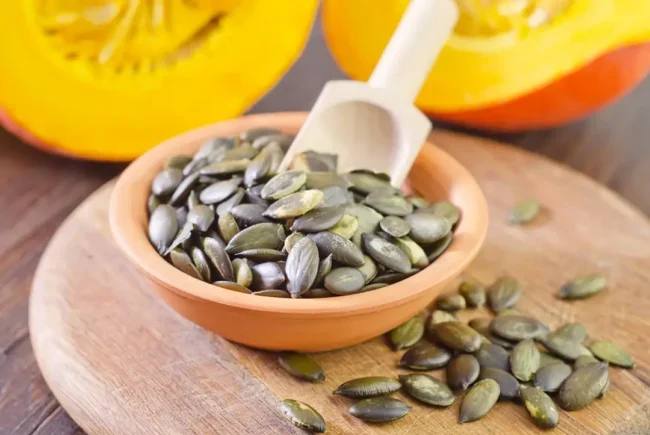A 100-gram serving of pumpkin seeds, also known as pepitas, typically contains the following approximate nutritional values:
- Calories: Around 559 kcal
- Protein: Approximately 30 grams
- Fat: About 49 grams
- Carbohydrates: Roughly 11 grams
- Fiber: Approximately 6 grams
- Vitamin K: Around 70 micrograms (mcg)
- Phosphorus: Approximately 1233 milligrams (mg)
- Magnesium: Roughly 592 mg
- Iron: Around 8.8 mg
- Zinc: Approximately 7.6 mg
These values can vary slightly depending on factors such as the specific variety of pumpkin seeds and how they’re prepared (e.g., roasted, salted, unsalted). Pumpkin seeds are a nutrient-dense snack rich in protein, healthy fats, fiber, and various vitamins and minerals, making them a popular choice for snacking or adding to salads, baked goods, or trail mixes.
Benfits of pumpkin seeds
- Nutrient-Rich: Pumpkin seeds are packed with essential nutrients, including protein, healthy fats, fiber, vitamins (such as vitamin K), and minerals (such as magnesium, iron, zinc, and phosphorus).
- Heart Health: The combination of healthy fats, fiber, magnesium, and antioxidants in pumpkin seeds may help promote heart health by reducing LDL (“bad”) cholesterol levels, lowering blood pressure, and reducing inflammation.
- Rich in Antioxidants: Pumpkin seeds contain antioxidants like carotenoids and vitamin E, which help neutralize harmful free radicals in the body, potentially reducing the risk of chronic diseases and slowing down the aging process.
- Supports Immune Function: The zinc content in these seeds plays a crucial role in immune function, supporting the body’s ability to fight off infections and illnesses.
- Improved Prostate Health: Some studies suggest that pumpkin seed consumption may support prostate health and help reduce the risk of benign prostatic hyperplasia (BPH), a common condition in aging men.
- Better Sleep: These seeds are a natural source of tryptophan, an amino acid that can help promote better sleep and relaxation. Tryptophan is a precursor to serotonin and melatonin, neurotransmitters involved in regulating sleep patterns.
- Blood Sugar Regulation: The fiber and protein content of these seeds may help slow down the absorption of sugar into the bloodstream, promoting more stable blood sugar levels and reducing the risk of insulin resistance.
- Healthy Skin: The combination of vitamins E and K, zinc, and antioxidants in pumpkin seeds may contribute to healthier skin by promoting collagen production, protecting against UV damage, and reducing inflammation.
Incorporating pumpkin seeds into your diet can be as easy as sprinkling them on salads, yogurt, oatmeal, or incorporating them into baked goods, granola bars, or trail mixes. They make a delicious and nutritious snack option that offers a variety of health benefits.







